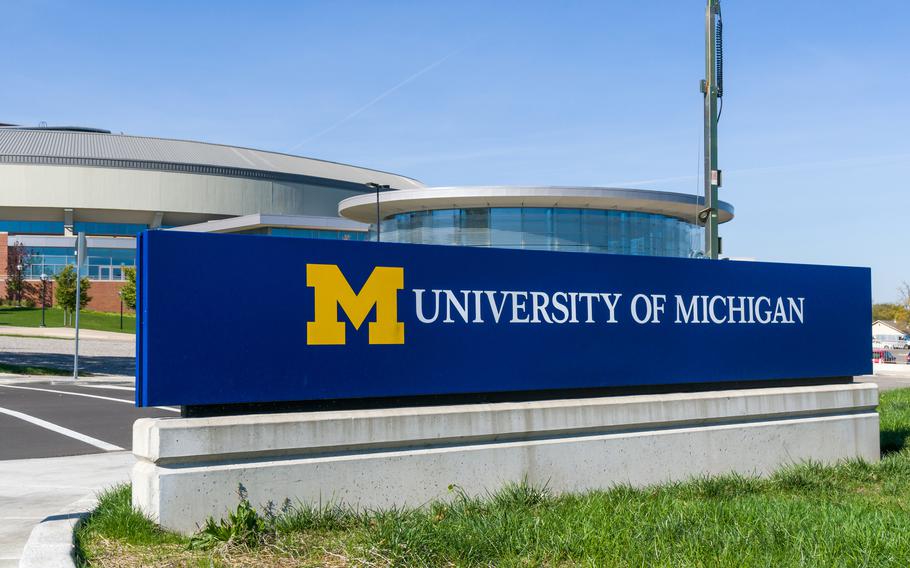
The University of Michigan is ending a two decade-long joint institute with Shanghai Jiao Tong University in China that provided global academic opportunities to hundreds of students following concerns about national security by federal lawmakers. (Ken Wolter/Dreamstime/TNS)
DETROIT (Tribune News Service) — The University of Michigan is ending a two decade-long joint institute with Shanghai Jiao Tong University in China that provided global academic opportunities to hundreds of students following concerns about national security by federal lawmakers.
UM announced the move Friday on its website and in a letter to U.S. Rep. John Moolenaar, a Republican from Caledonia who chairs the the House Select Committee on the Chinese Communist Party, a congressional panel focused on economic and national security issues concerning China.
UM’s move comes after a September report from the House committee arguing that federally funded researchers have helped China advance technologies in military and other applications, potentially posing a national security threat to the U.S. Moolenaar sent a letter soon after to Ono, suggesting that UM’s partnership with SJTU had been compromised.
The decision by the state’s largest and most prestigious university to end the institute with the Chinese university came after discussions with lawmakers and UM stakeholders, officials said.
“International academic partnerships have deeply enriched our academic offerings and strengthened the global education of our students, and we will continue to pursue partnerships around the world as part of our academic mission,” Ono said in a statement on UM’s University Record. “As we do so, we must also prioritize our commitment to national security.”
Ono also sent a letter to Moolenaar, and outlined steps the university had taken leading to the decision to end the partnership.
Moolenaar hailed UM’s decision.
“My committee has put a spotlight on the fact that too many American universities are collaborating with CCP researchers on critical technologies including weapons, artificial intelligence, and nuclear physics,” Moolenaar said. “The results of these collaborations could one day be turned against our country, and we cannot allow that to happen.”
UM and SJTU established a joint institute in 2005, and involved the placement of American and Chinese students at UM and in China. It offered engineering degree programs accredited by the Accreditation Board for Engineering and Technology, with all courses taught in English. Officials said almost all students pursuing an international education experience.
During the 20 years of the partnership, more than 1,000 undergraduate students from UM and other universities experienced global learning opportunities, officials said. The partnership also included many academic exchanges such as dual-degree programs, scholarships and study-abroad opportunities.
UM emphasized the students currently enrolled in the program would be able to complete their degrees.
In October, Moolenaar sent Ono a letter after five UM graduates who were charged in federal court after trespassing onto Camp Grayling with cameras, near numerous military vehicles, tents and classified communications equipment. The five came to the state through the partnership between UM and Shanghai Jiao Tong University, officials said.
Moolenaar alerted Ono to a legislative committee report that documented cases, “in which (People’s Republic of China) defense affiliated institutions leveraged the expertise and capabilities of American researchers — often developed with federal research funding — to enable (China) to achieve significant technological advancements in critical and emerging technologies with defense applications.”
“The report specifically identifies U.S.-PRC academic joint institutes as a core channel leveraged by the (Chinese) government,” Moolenaar wrote, “and its affiliated entities through which sensitive U.S. technologies and research know-how are transferred to the PRC’s defense and research industrial base.”
After a review of the issues raised by Moolenaar, Ono wrote that UM has begun the process to officially end the partnership with SJTU by initiating the six-month termination action clause. UM also confirmed that there are no research engagements between UM and the university in China.
“Building on these decisive actions, we have required all faculty and staff associated with the UM-SJTU Joint Institute to fully disclose any affiliations they may have with external entities, including other academic institutions, government agencies, or businesses, as well as any commitments within different units of Shanghai Jiao Tong University,” Ono wrote. “We have reviewed these disclosures to ensure that no one holds commitments that could conflict with our research integrity standard.”
In the University Record, Ono emphasized how international education is paramount and international students, faculty and staff are essential on U-M’s campus.
“International experiences are vital for our students in this interconnected world,” he said. “We remain committed to supporting U-M’s international students and will continue to foster international partnerships that advance knowledge and cross-cultural understanding and ensure our campus remains a vibrant community where scholars from around the world can thrive.”
UM’s decision to cut ties SJTU follows a similar move by Georgia Tech, which announced in September the ending of a partnership with Georgia Tech Shenzhen Joint Institute and University of California. Berkeley, which began the process of ending a partnership with Tsinghua University.
©2025 www.detroitnews.com.
Distributed by Tribune Content Agency, LLC.